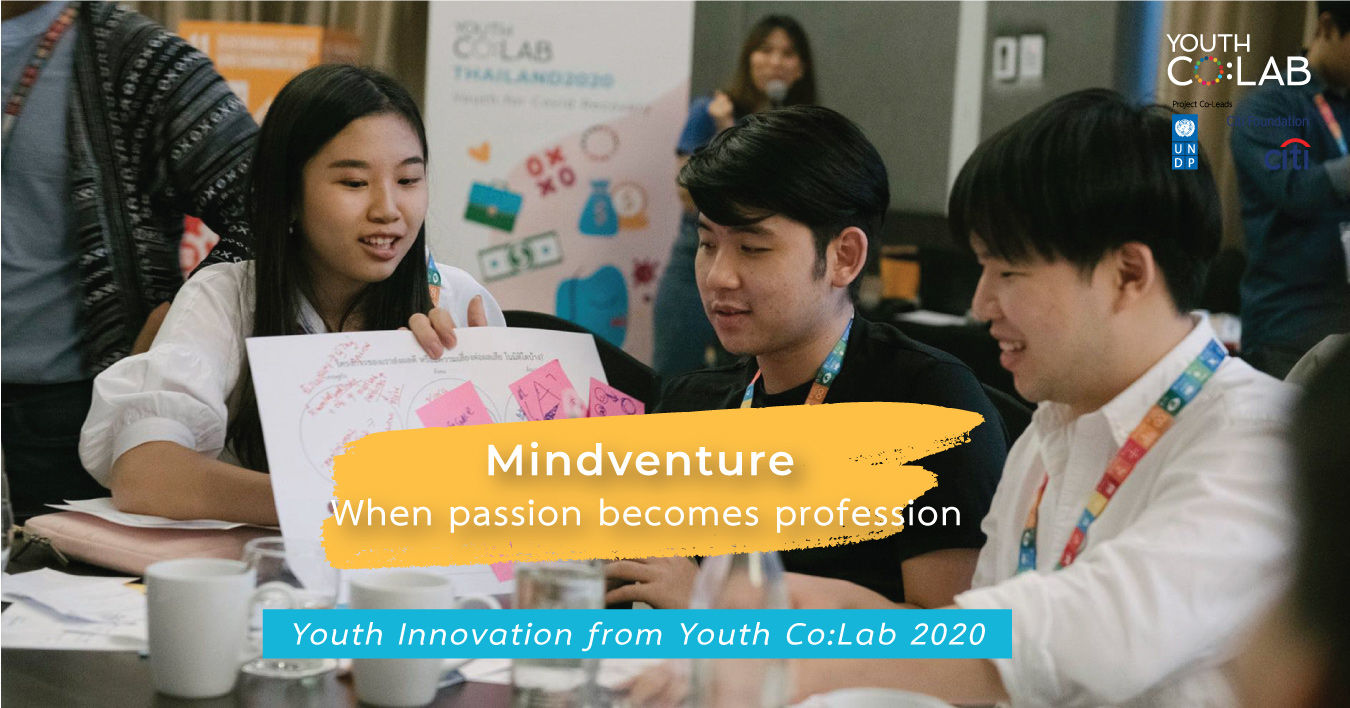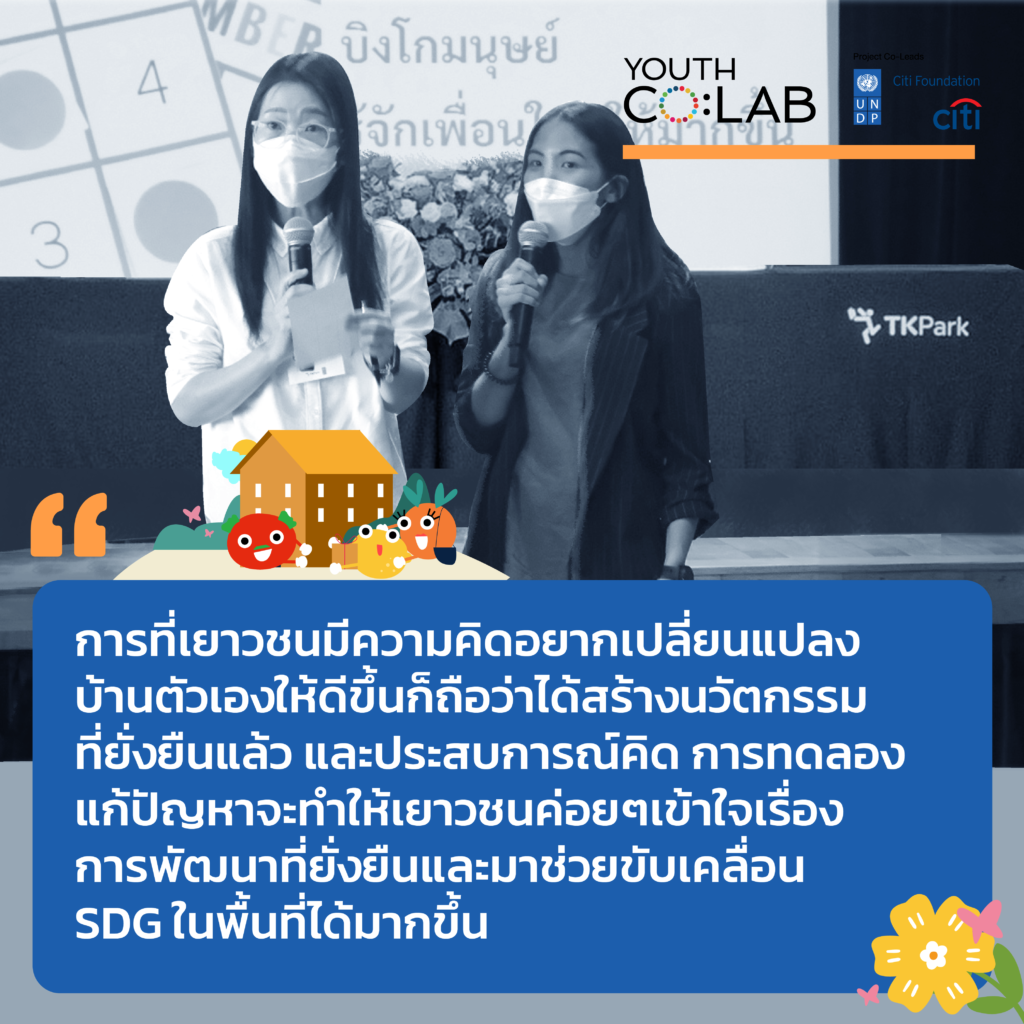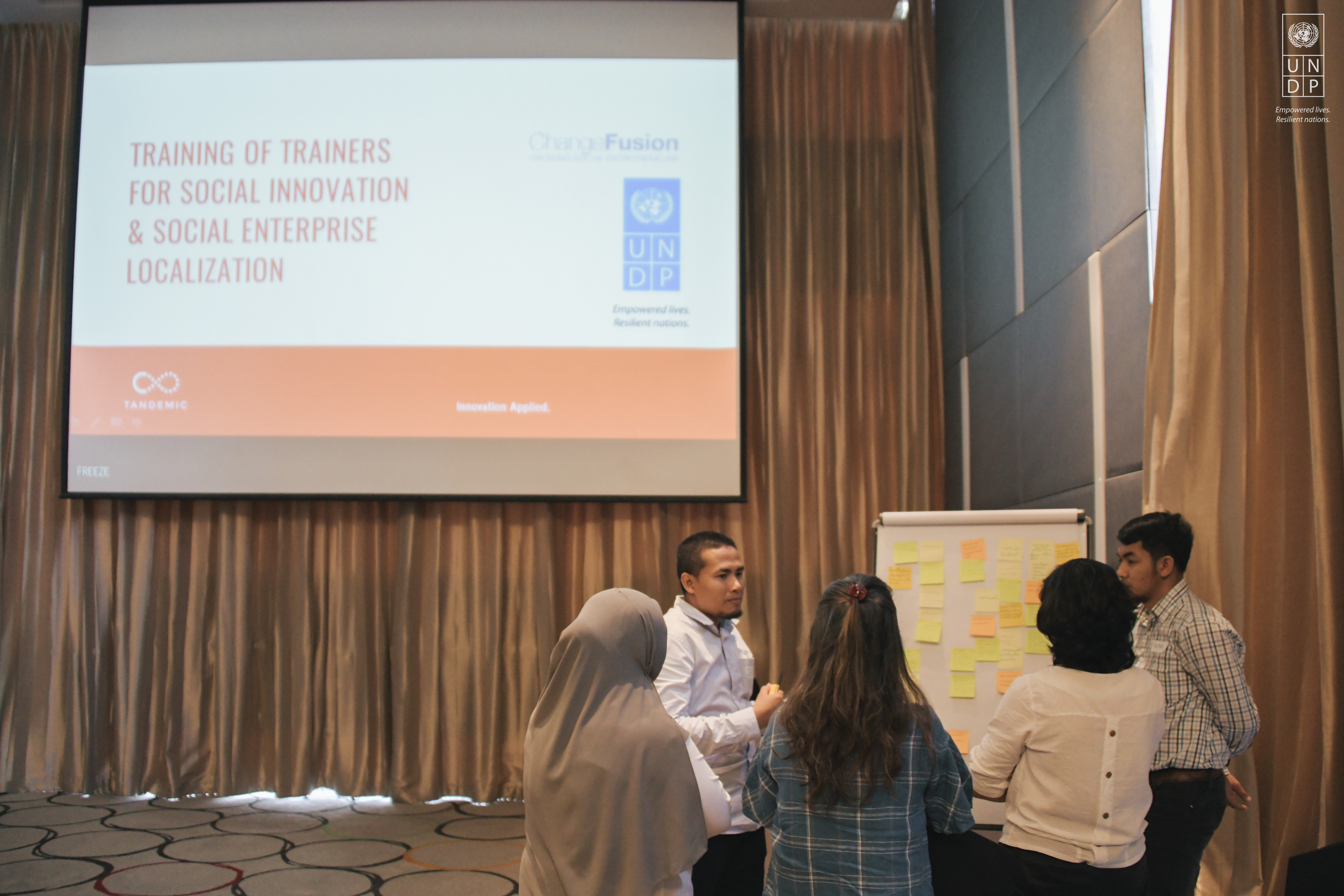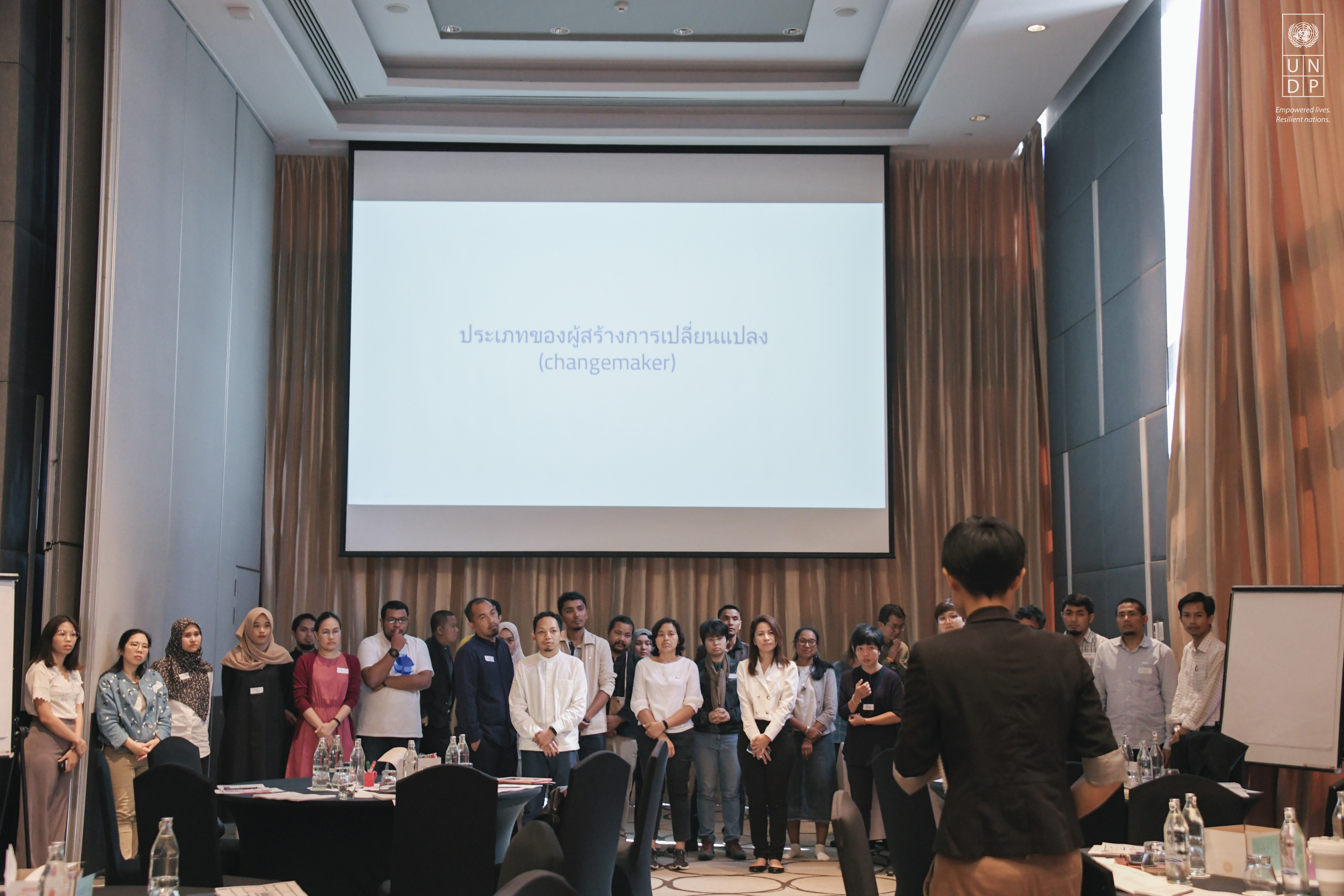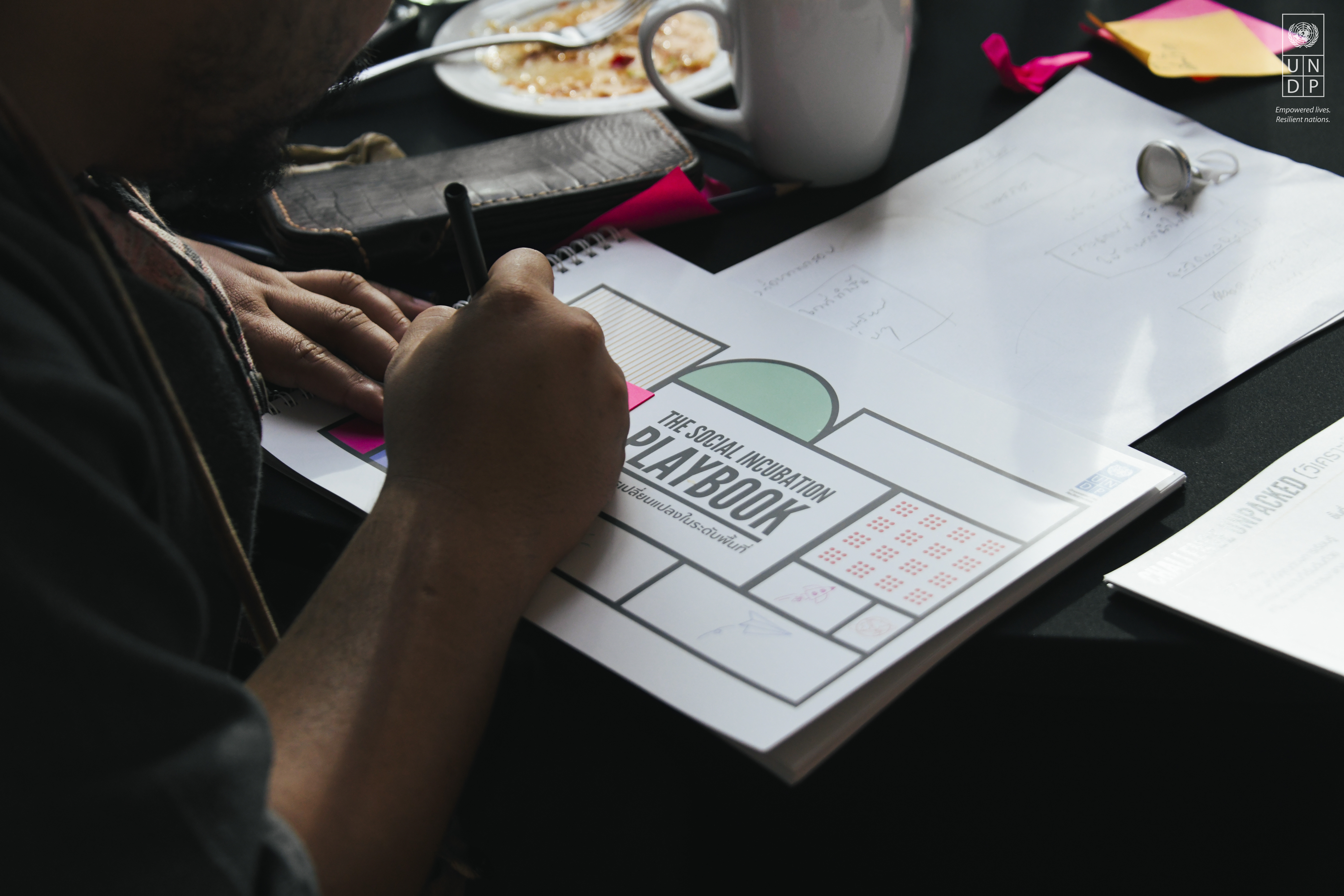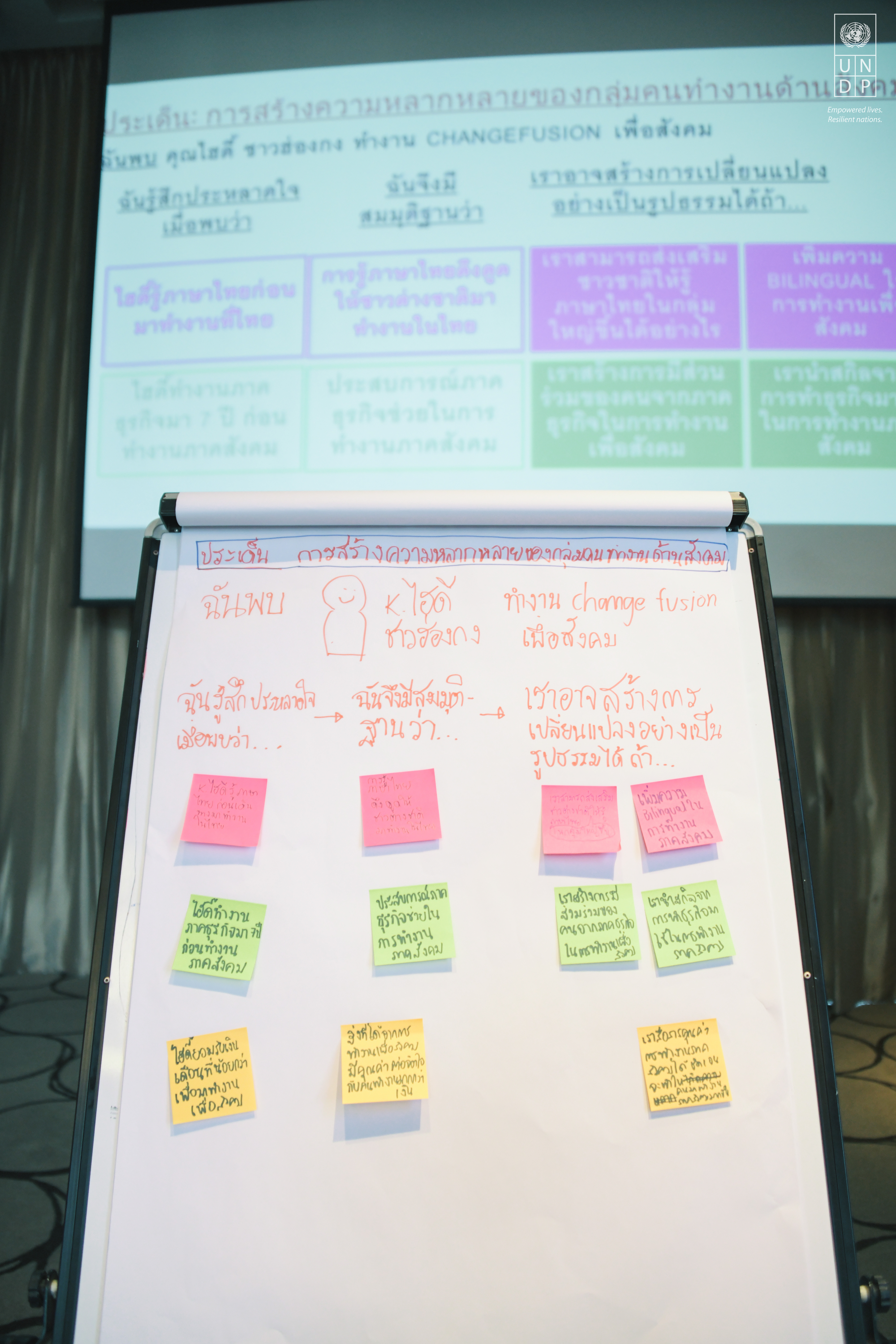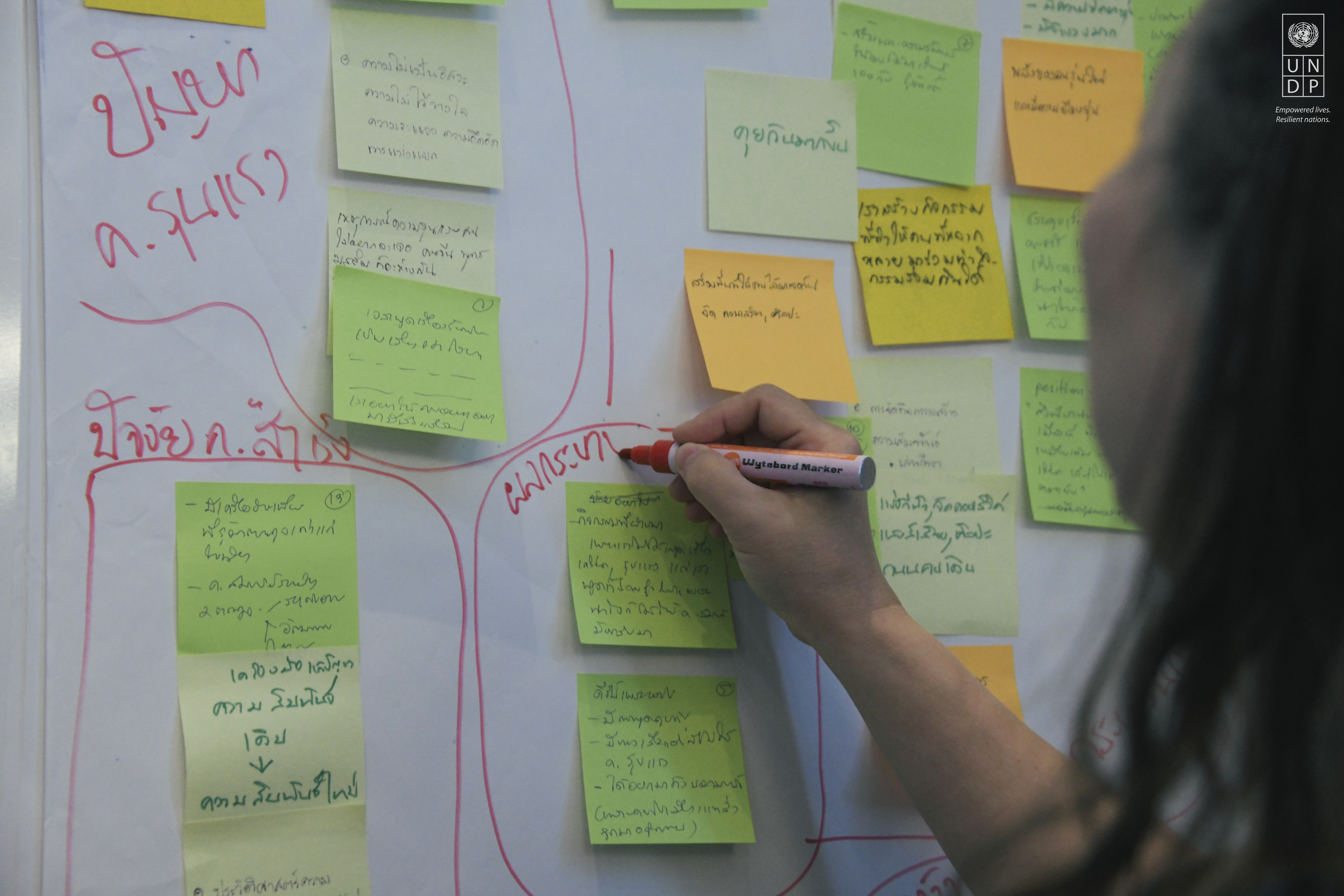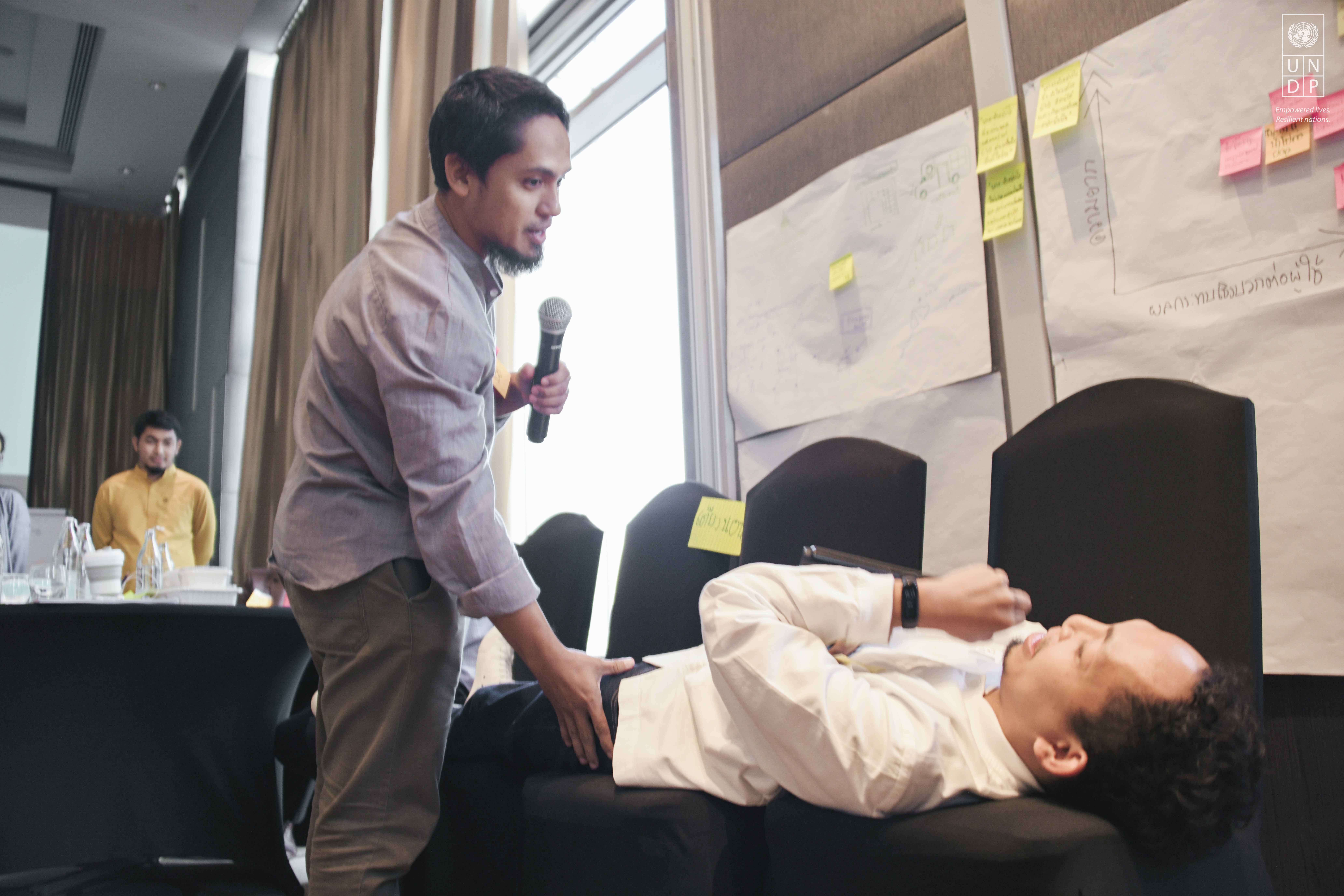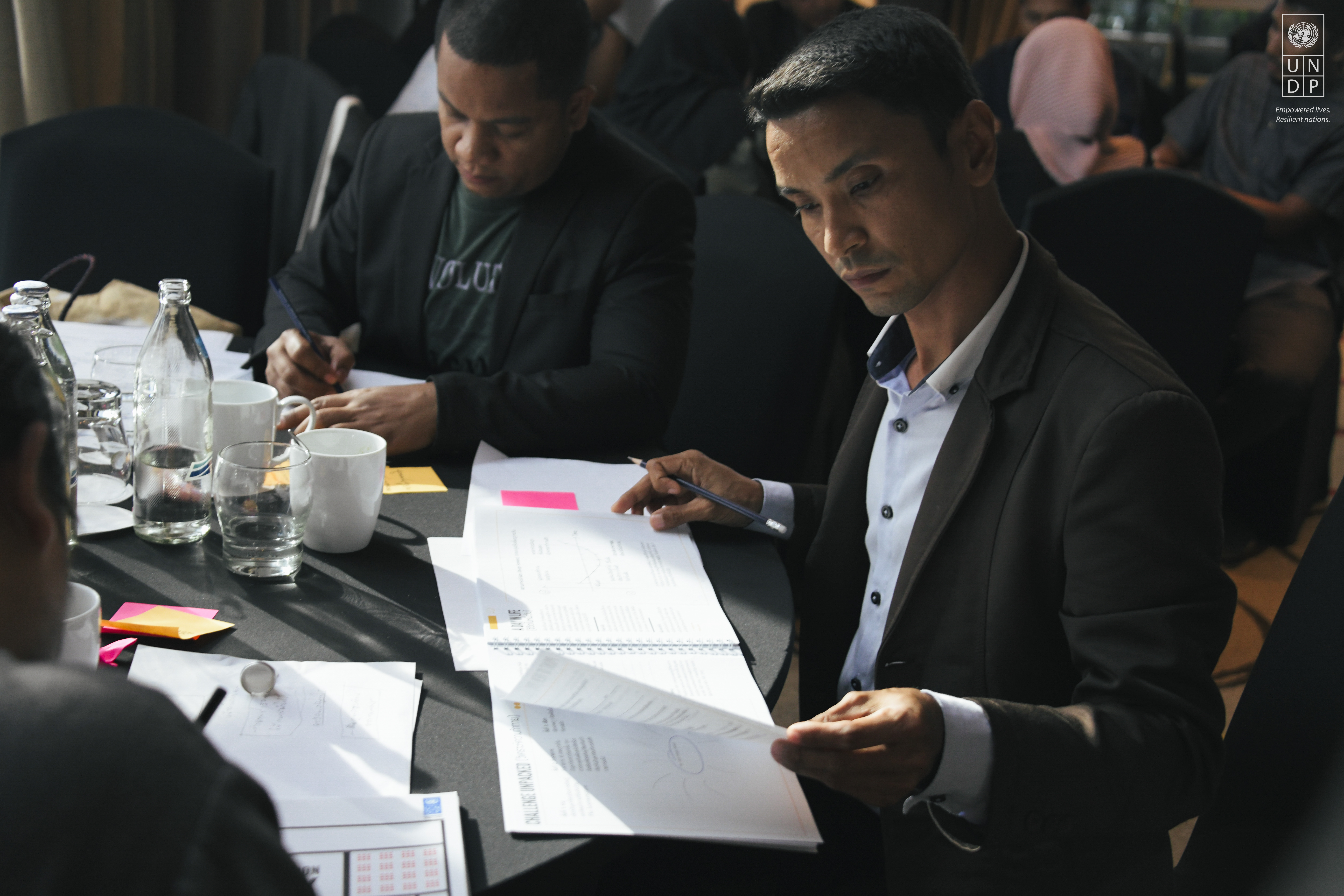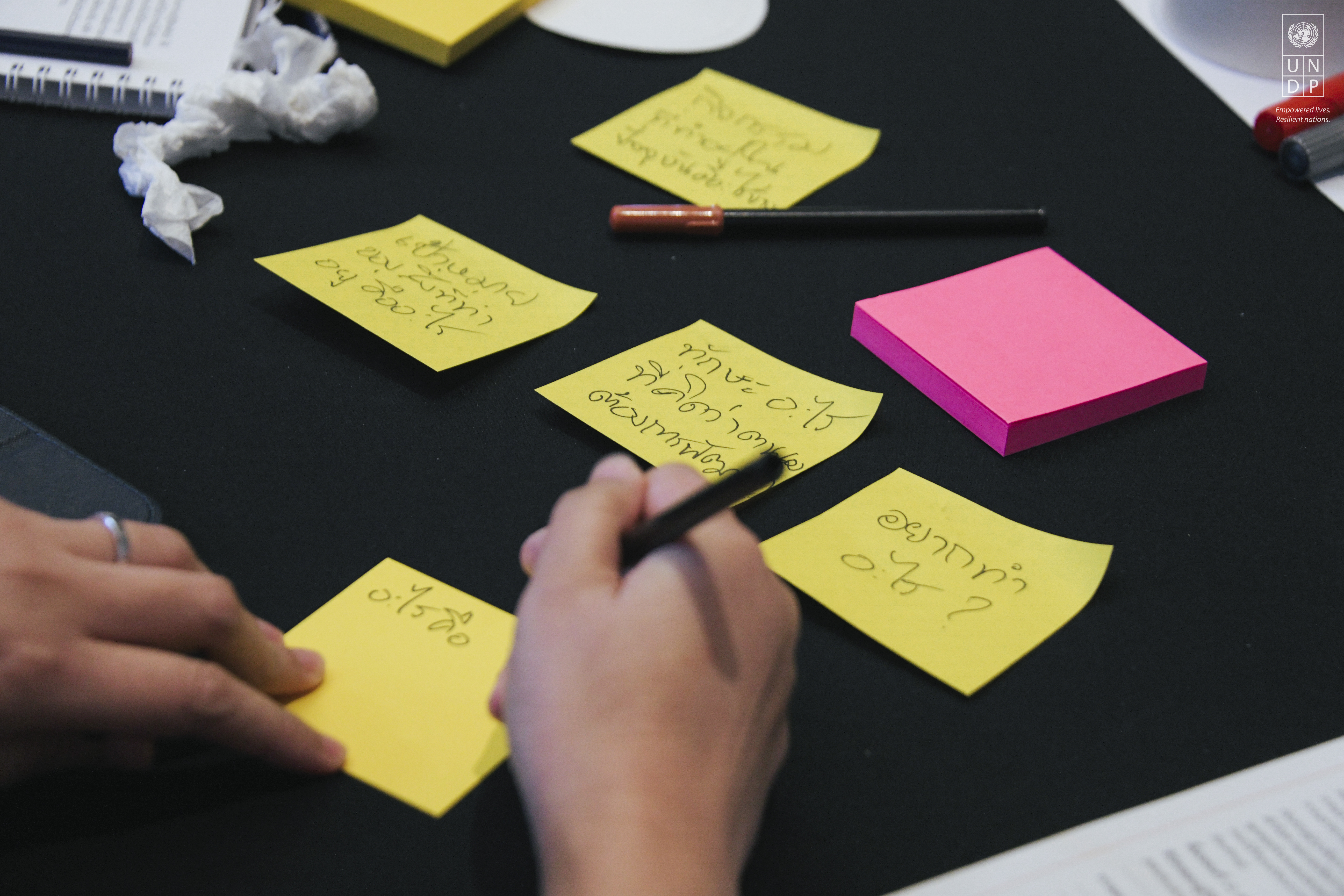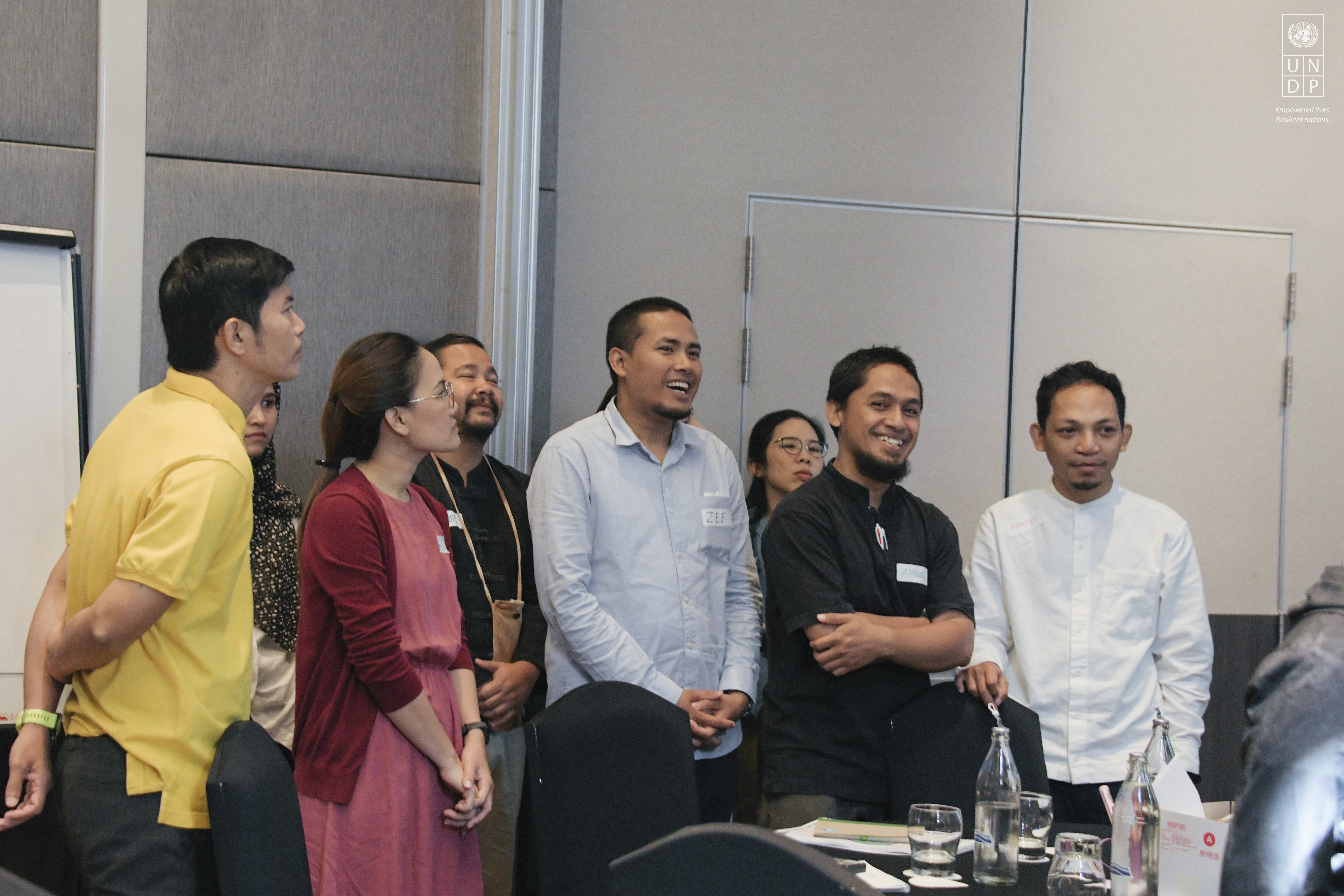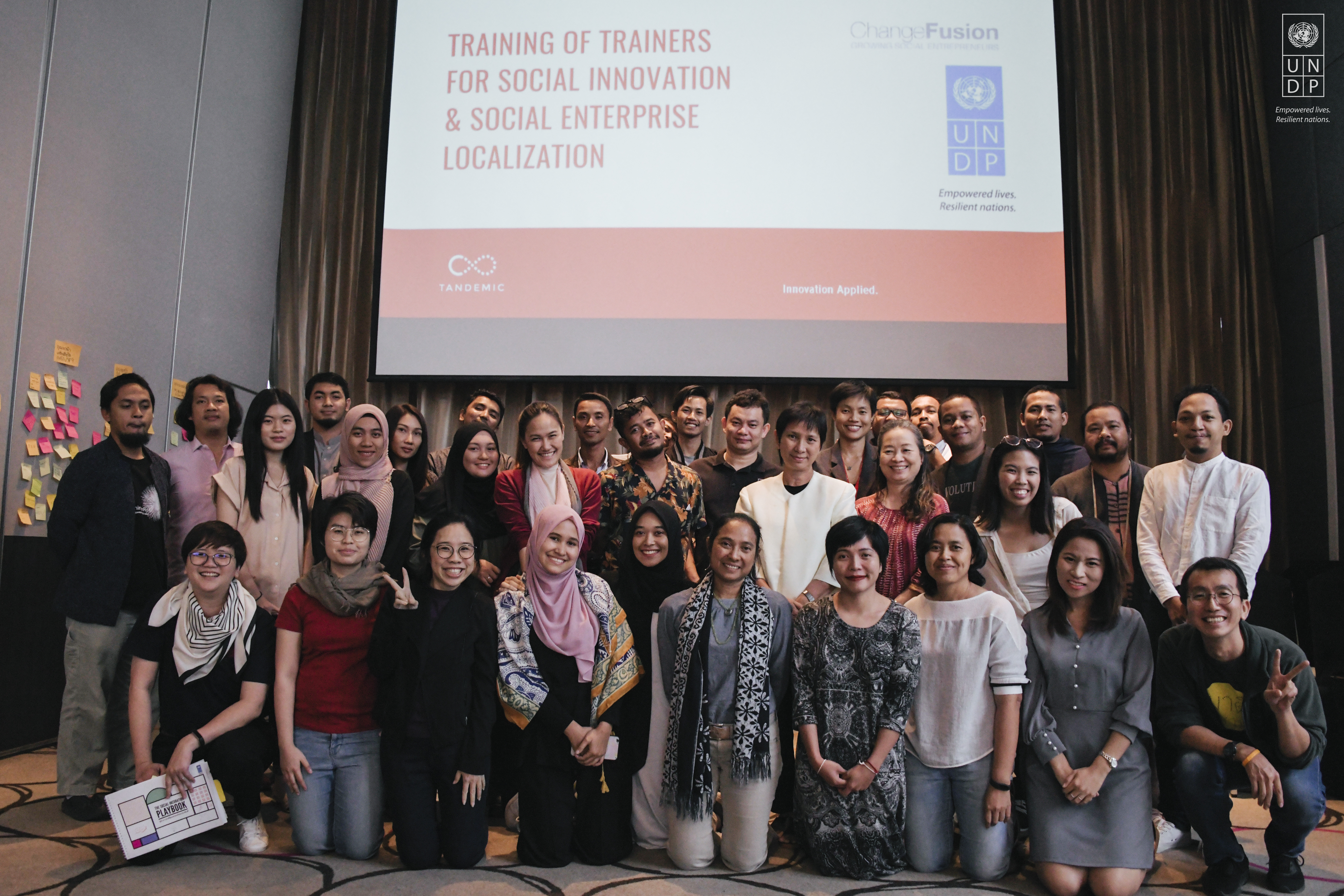
Youth is an age full of energy and creativity. Nowadays, youth is not only thought of as the beneficiaries, but also has a role as ‘Driver’ of sustainable development. One of the most important things that allow young people to take part as an agent of change is to create a space in the society where people can listen to their voices and enables them to show their full potential to shape the future they will live in. Hence, Youth Co:Lab is initiated with the intention of creating a social change from the youth level
Youth Co:Lab is an Asia-Pacific regional initiative co-leads by the United Nations Development Programme and Citi Foundation. The initiative is established with a common agenda for the Asia-Pacific region to empower and invest in youth, so they can accelerate the implementation of the Sustainable Development Goals (SDGs) through leadership, social innovation, and social entrepreneurship, as well as taking part in driving the economy and solving the region’s most pressing challenges. In Thailand, the initiative has been continued for 3 consecutive years.
The approach of Youth Co: Lab Thailand is to search for social innovation ideas from youth all over Thailand and bring them to the rapid-fire workshop to develop their capacity with a Human-centered Design process, and to also learn about the sustainability model, so that they can shape their projects before pitching to the judiciary committee to find funding for making their projects become real. This year, we are more ambitious than ever as we would like to cover more complicated and deeper issues. That is, to make the vulnerable youth fully understand the complex global challenges and to be able to concretely apply social innovation concept to solve those issues more sustainably.
We asked ourselves, what will happen if we choose to work with great ideal and abstract issues? Could the use of a social innovation approach and methodology make the abstract more concrete and tangible? To answer the questions, we decided to try it out, hence, “Preventing Violent Extremism, conflict management, and inequality” become the underlying concepts of Youth Co:Lab Thailand this year.
The substrate of the world’s violent extremism, conflict and inequality seem to be accumulated from people’s different thoughts and perspectives. Oftentimes, it leads to ‘judgement’ and ‘stereotype’ on others. To solve these problems, it requires a deep understanding of the context and its root cause, which individual can start from being open-minded and embracing diversity. Creating a society where all “Respect Differences and Embrace Diversity” therefore becomes a theme of Youth Co: Lab Thailand 2019. In the Kingdom of Thailand, diversity has caused and affected prejudice and segregation in many different social dimensions, including ethnicity, religion, political opinion, access to resources, etc. These differences are the beginning point of the cleavage, climbing over and pressing each other, to the confrontation and socio-economic inequality, which can lead to violence in order to confirm one’s standpoint.
With the theme of “Respect Differences and Embrace Diversity”, our work processes are required to reflect on this value as well. We, therefore, determined to reach out to various youth groups as many as possible. And because we believe that good innovation is the one that can actually solve the problems and better our society, and 99% of the time, it first comes from the understanding in the roots of the problem and the needs of the people, we would like to have young girls and boys who personally and directly experiencing the challenges to speak up, provide inputs, and submit social innovation ideas themselves. Also, because Youth Co: Lab is an initiative to help develop innovation capacity of youth, we believe that if we apply this tool to the youths experiencing those problems, they may be able to harness such tool to create the change in their area.
Even though Youth Co: Lab Thailand 2019 may have looked like just a 3-day-event, on the contrary, it is actually a process designed and operated over months to make the initiative a truly nurturing and inclusive program. In this article, we will talk about the methodology, process and lesson learned in 2 parts: 1) before and 2) during Youth Co:Lab Thailand 2019.
Before Youth Co:Lab Thailand 2019

Roadshow in each region of Thailand
In the North, Northeast, and South, we worked with partners to gain access to the network of youth working on peace, conflict and inequality. Each roadshow has a different approach and style depending on the context of the local area. For instance, in the South, we visited 4 different youth groups at their usual gathering location. In the Northeast, we organized the roadshow at the university to reach students who drive for human rights and social development through their club activities. As for the North, we coordinated with indigenous youth network in order to reach youth from various ethnic backgrounds. This format adjustment in different areas allows us to reach the vulnerable youth groups more appropriately and effectively. Nevertheless, the content of the roadshow still contains the same primary points – to let young people share and discuss the differences, and how it leads to a certain situation in their area, to introduce social innovation concepts, and to consult and give advice on their project development.
Hearing the stories young people shared during the roadshow gave us a deeper understanding of each context on diversity and how it links to the challenges and opportunities. It also makes us feel even more confident that we are actually reaching to the right persons we are looking for – youth who are ‘in’ the problems and whom their stories are not usually heard in the society. For example, the story of a young stateless youth and their effort to obtain Thai citizenship for over 11 years, or the female Muslim football team who does not dress according to religious principles due to the lack of sport-friendly and agility of existing garments which leads to some misunderstandings and negative feedback from the local people, etc. After we try to look through lenses from their perspective, the next step is to invite them to look through our lenses, from the social innovator perspective. Many may think that innovation is very distant and challenging because they feel that it is only a matter of futuristic and complicate technology, when, in fact, it is not. Therefore, we have to provide a foundation and the most basic definition to make them understand that that social innovation is actually “new things, new approaches, new methods, new process to solve the same old problems to meet the social need in a better way than the existing solutions” which it could be something they are already doing. We also gave an example of case studies from around the world to help illustrate and create a clearer picture of the practice.
However, even they started to embrace social innovation to heart, “Will my project be good enough to compete with the other talents?” is the question we seem to hear from every youth in every region. And every time, we would smile back and tell them “You are a person ‘in’ the problem meaning that you know the problem better than anyone else, and when you rise to solve yourself the problem, you are nothing more than the expert.” The questions reflect a lot on their lack of self-confidence, and that is why we want them to see what we see of how brave and powerful they are. Hence, at the end of the roadshow, we help increase their confidence by providing them opportunities for consultation concerning what projects they want to do or currently work on, and how they should further develop in order to apply for Youth Co: Lab Thailand 2019.
At the end of the application period, we were pleased to see all the youths we met have overcomed their fears and decided to submit the project for this initiative.

Homework and Preparation
As the duration of Youth Co: Lab Thailand 2019 is rather short, developing and changing a project within 3 days is almost impossible. Therefore, it is necessary to give some homework to prepare and get the participants ready first. Although the proposed projects are in different stages of development, some projects are just starting with ideas, while some projects have prototypes or already put the products out to the market. Still, in order to actually carry on with the project, every project, regardless of any stage must have a clear answer on and understanding of the users or someone they want to resolve the problems for. Therefore, the 10 finalist teams were instructed to interview the beneficiaries and those involved, then analyze those data and compile with the goals and vision that each team wants to achieve for the better future through the “Theory of Change” in order to review their determination and objective of the project.
The homework given encourages young participants to deepen their understanding and testing their assumptions on what works and what doesn’t. We did not expect that every team would come with an accurate answer because we know that it is impossible as the social innovation process must be done repeatedly and continuously. Therefore, the hidden purpose of this homework is to help young people to break out of their comfort zone and the old way of thinking, to see in the perspective of users, and to get familiar with the tools before coming to the 3-day-event.
What happened during Youth Co:Lab Thailand 2019

Friendship
exchange of experiences of youth who have common value and determination to solve social problems to learn from each other. The sharing of experiences hence creates a strong youth network, as well as nurtures changemakers at the local level. For this reason, we give priority to creating a space for participants to build a relationship and learn about each other’s nature with respect and tolerance. The activities on the first night of the event, therefore, focus on creating a relaxed atmosphere, networking, and getting to know each other. Of course, a bit of knowledge on SDGs and social innovation are always integrated here and there.
The activities are divided into 3 parts consisting of:
1) Learning about SDGs through case studies of social innovation in both Thailand and abroad. The content is communicated through game-playing, the Giant Jenga, which must be played in harmony as a team, allowing youth to start opening up to each other.
2) Sharing of experiences from youth speakers from the North, Central, and South on their motivation, challenges and opportunities, as well as success and failure working on social innovation for peacebuilding. Followed by networking dinner where participants get together with new friends and have a chance to casually exchange discussion with the speakers.
3) Getting to know friends’ identities through games such as ‘I am… but I am not…’, to open up conversation while dining, and ‘Common Ground’, to find common/different areas or traits of each person to make them get familiar with each other, feel comfortable enough to reveal their thoughts and opinions, and be able to understand and embrace those who are different.


Creating a safe and comfort zone
The networking on the first night may be the first door to embracing diversity, still, creating a safe zone before starting the intensive workshop is also as important. Our approach begins with emotion and expectation checking, allowing young participants to pour out their “fear”, concern, and pressure on what will happen during the event. By opening up, participants feel more connected to each other as they start to understand the nature of human emotions, and shift their mindset from Youth Co:Lab as a competition to Youth Co:Lab as collaborative learning.
Creating a safe zone does not only occur at the beginning of the workshop, but repeatedly from start to finish. The role of facilitators is not just teaching and designing the process but must also be someone who always keeps an eye on and recognizes participants’ feeling and emotion during the whole process. If the facilitator feels the conditions of oppression or worry from the participants, it may be necessary to take a short break to release anxiety or to share feelings with each other again so that participants’ learning experience can flow in balance.


Deepen the understanding of the problems
Almost half of the workshop is spent on Theory of Change, deepening the understanding of the issues and its context, and reviewing the solution if it aligns with the team’s future goal. Also, through the iceberg Model and systemic thinking, participants went back again to seek for the root cause behind actions and behaviours. For example, the system that causes such behaviours, and what is it that one believes and values that influences their actions.
Taking the time in this process does not only help each team to have a clearer picture of their ideas, but also create a feeling of connectivity as they see that the phenomena that happened, although in different form and different places, have a common underlying cause – people don’t see and treat everyone as ‘equal.’ Understanding the problem in interrelated dimensions reduces competitive barrier, propel friendship, and make them realize that “We are not tackling this big and difficult problem alone.”

Project development through Peer-to-Peer learning.
Continuously in every step of the workshop, the practice we used to help participant build their capacity and advance their projects is the Peer-to-Peer learning. Participants have the opportunity to present the project to their peers, as well as providing feedback and recommendation in return. The process brought back participants from the overwhelming of their own issues and encourage them to look at the other aspects of the problem as well as expand their perspective, which may be useful for their project development. This process also emphasizes on the agenda of Youth Co:Lab, that is to make realized that the problem today is a shared problem which needs the hands of everyone in the society and that we cannot change the society if we focus only on our own problem. Youth Co:Lab is the safe space of collaboration, hence, the money reward is not the main goal.

Consulting with Mentors
In the application form for Youth Co:Lab Thailand 2019, we asked the applicants about the area in which they would like to seek consultation and mentorship as we believe that by meeting and talking with an experienced expert will definitely help strengthens their capacity and integrate wider knowledge for more sustainable development. For this reason, we brought together experts from different industry including business, media, law, naturalization, technology, gamification, partnership management, learning process design, peacebuilding and conflict management, and participatory democracy to give creative advice. This learning process helps participants’ idea to get closer to the truth.

Storytelling
This last session with no less important than the others is the storytelling for pitching. Learning to design one’s own narrative is not only to win the prize money but also to speak up and voice out to the general public about the problem they have been facing in their communities, which may be unknown to the outsiders, as well as showing their passion and determination on solving these problems. Although the pitching technique that we taught is effectively structured and very usual for most of the pitching stages, we always emphasize that if participants do not agree with the example given, they don’t need to follow at all. Only do what they think is best for them. The most important thing is that they get to express their story and the public become more aware and collectively start to do so as well.


At this point, we can see that behind all the process happened in Youth Co:Lab Thailand 2019, the innovation competition is only a door to invite people to take interest and apply for the program. The heart of the initiative is nevertheless “a platform for collaboration among youth to lead the social change,” which contain the exact meaning of Youth (young people) Co (Collaboration) Lab (Laboratory – experimenting with new things). At the end of the event, we feel very proud to see the result we hope for – a strong youth partnership and the passion and determination on solving the World’s most complex challenges in order to sustain peace in their local communities. We heard loud applause and cheering of youth for the other teams during the pitching. We see the development of a friendship that even after the event, they all still keep in touch with each other and sometimes gather to do good or to do new projects. These are our indicators of the success of Youth Co:Lab Thailand 2019, which we have proved that the competitiveness in the collaborative atmosphere can happen. In fact, it is better that competition and collaboration happen at the same time. Indeed, ‘peacebuilding and sustaining peace’ is a difficult, complex and interrelated challenge which must be solved through a collaborative model in order to create sustainable development for the better future.

Finally, Thailand Social Innovation Platform under the United Nations Development Programme would like to thank all of our partners for making Youth Co: Lab Thailand 2019 happened:
– Citi Foundation, our regional co-leads;
– The European Union, National Innovation Agency, and Air Asia for sponsoring Thailand’s event;
– Office of National Security Council – we are very honoured that you joined the judging committee;
– Thailand Institute of Justice, our absolute amazing facilitators;
– All mentors who passionately gave invaluable advice to our young participants;
– Mr. Wannasingh Prasertkul for being our ambassador and took part in filming the promotional video;
– Our young participants – for your passion and giving us hope for the brighter future.
